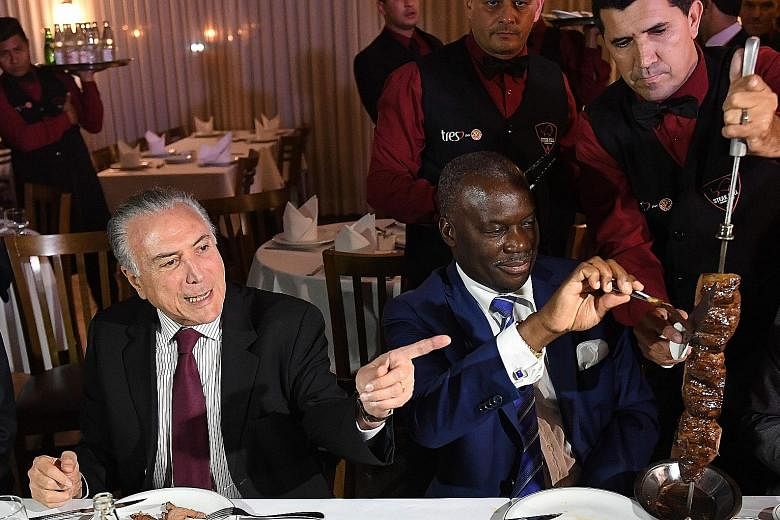SAO PAULO • Fallout over a Brazilian meat corruption scandal spread yesterday, with China, Chile and South Korea suspending some imports, the European Union mulling over action and shares of meatpacking companies BRF SA and JBS SA dropping.
China, Brazil's top trade partner, decided to suspend the import of meat products from Brazil as a "precautionary measure", said a source who requested anonymity because of the sensitivity of the information.
South Korea's Agriculture Ministry said in a statement that it would tighten inspections of imported Brazilian chicken meat and temporarily bar sales of BRF chicken products. The South Korean ministry said that suppliers of Brazilian chicken would have to submit a health certificate issued by the Brazilian government.
Chile said its ban on Brazilian meat would stay in place until Brazil confirmed that companies exporting meat to Chile had been correctly vetted.
The actions came after Brazilian police investigators last Friday named BRF, JBS and dozens of smaller rivals in a major investigation of alleged bribery of health inspectors to hide unsanitary conditions in plants.
Police conducted raids last Friday in six states to seek more evidence, tarnishing one of the few vibrant sectors in Latin America's biggest nation, which is suffering its worst recession on record.
The two-year probe, known as Operation Weak Flesh, found evidence that meatpackers paid off inspectors and politicians to overlook practices including processing rotten meat and shipping exports with traces of salmonella, police said.
Shares of BRF SA fell 8 per cent, while those of JBS SA dropped 5 per cent yesterday.
The companies have strongly denied any wrongdoing.
Shares of Minerva SA and Marfrig Global Foods SA , which are not involved in the investigation, also fell sharply as traders fretted over the possibility of further import bans.
Credit Suisse Securities analyst Victor Saragiotto wrote in a note to clients yesterday that the scandal "could be enough to compromise temporarily Brazilian protein's acceptance worldwide".
Brazil exported US$6.9 billion (S$9.64 billion) of poultry and US$5.5 billion of beef worldwide last year, according to industry groups.
Brazilian meat is exported to more than 150 countries, with principal markets as far apart as Saudi Arabia, China, Singapore, Japan, Russia, the Netherlands and Italy.
More than 80 per cent of the 107,400 tonnes of chicken imported by South Korea last year came from Brazil, and almost half of that was supplied by BRF.
The European Commission said that it would monitor meat imports from Brazil, and any companies found to be involved in a meat scandal there will be denied access to the EU market.
"The commission will ensure that any of the establishments implicated in the fraud are suspended from exporting to the EU," a spokesman for the European Commission told a media briefing.
The commission said the scandal would have no impact on negotiations between the EU and South American bloc Mercosur about agreements on free trade.
Meanwhile, Brazil has tried to reassure the world that its huge meat industry poses no threat.
President Michel Temer smiled on Sunday as he invited diplomats to a traditional Brazilian meat restaurant called a churrascaria, saying: "If you accept the invitation, we will be very happy."
Nineteen of the 33 envoys who met him accepted the offer.
In his address to the ambassadors, Mr Temer acknowledged that the scandal had generated "major concern". But he insisted that the bad meat and faked certificates occurred in only "very few businesses" and did not represent a wider problem.
Calling Brazil's inspection system "one of the most respected" in the world, Mr Temer said: "I want to reiterate our confidence in the quality of our products."
Last year, 853,000 consignments of animal products were exported, he said, yet "just 184 of them were deemed by importers to be in violation".
AGENCE FRANCE-PRESSE, REUTERS, BLOOMBERG

